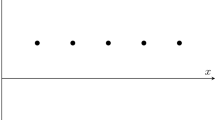Abstract
I put forward several desiderata that a philosophical theory of causality should satisfy: it should account for the objectivity of causality, it should underpin formalisms for causal reasoning, it should admit a viable epistemology, it should be able to cope with the great variety of causal claims that are made, and it should be ontologically parsimonious. I argue that Nancy Cartwright’s dispositional account of causality goes part way towards meeting these criteria but is lacking in important respects. I go on to argue that my epistemic account, which ties causal relationships to an agent’s knowledge and ignorance, performs well in the light of the desiderata. Such an account, I claim, is all we require from a theory of causality.
Similar content being viewed by others
References
Armstrong, D. (2004). Truth and truthmakers. Cambridge University Press: Cambridge.
Bird, A. (2005). Laws and essences. Ratio, 18, 437–461.
Cartwright, N. (1983). How the laws of physics lie. Clarendon Press: Oxford.
Cartwright, N. (1989). Nature’s capacities and their measurement. Clarendon Press: Oxford.
Cartwright, N. (1999). The dappled world: A study of the boundaries of science. Cambridge University Press: Cambridge.
Cartwright, N. (2001). What is wrong with Bayes nets? The Monist, 84(2):242–264.
Cartwright, N. (2003). What makes a capacity a disposition? Causality: Metaphysics and methods discussion paper 10/03, London School of Economics Centre for Philosophy of Natural and Social Science.
Dowe, P. (2000). Physical causation. Cambridge University Press: Cambridge.
Gillispie, S. B., & Perlman, M. D. (2002). The size distribution for Markov equivalence classes of acyclic digraph models. Artificial Intelligence, 141, 137–155.
Glymour, B. (2003). On the metaphysics of probabilistic causation: Lessons from social epidemiology. Philosophy of Science, 70, 1413–1423.
Hume, D. (1748). Enquiry into the human understanding. In Enquiries concerning human understanding and concerning the principles of morals, third (1975) edition. Clarendon Press: Oxford.
Jaynes, E. T. (2003). Probability theory: The logic of science. Cambridge University Press: Cambridge.
Kant, I. (1781). Critique of pure reason. Macmillan (1929), second (1787) edition. Trans. Norman Kemp Smith.
Lewis, D. K. (1973). Causation. In Philosophical papers vol 2, (pp. 159– 213). Oxford University Press (1986), Oxford.
Menzies, P., & Price, H. (1993). Causation as a secondary quality. British Journal for the Philosophy of Science, 44, 187–203.
Mill, J.S. (1843). A system of logic, ratiocinative and inductive: Being a connected view of the principles of evidence and the methods of scientific investigation, seventh (1868) edition. Longmans Green Reader and Dyer: London.
Papineau, D. (1992). Can we reduce causal direction to probabilities? Philosophy of Science Association, 1992(2), 238–252.
Pearl, J. (2000). Causality: Models, reasoning, and inference. Cambridge University Press: Cambridge.
Price, H. (2005). Causal perspectivalism. In: Price, H. & Corry, R., (Eds.), Causation, physics and the constitution of reality: Russell’s republic revisited. Oxford University Press: Oxford.
Russell, B. (1913). On the notion of cause. Proceedings of the Aristotelian Society, 13, 1–26.
Salmon, W. C. (1998). Causality and explanation. Oxford University Press: Oxford.
Schaffer, J. (2005). Contrastive causation. The Philosophical Review, 114(3).
Shoemaker, S. (1998). Causal and metaphysical necessity. Pacific Philosophical Quarterly, 79, 59–77.
Spirtes, P., Glymour, C., & Scheines, R. (1993). Causation, prediction, and search, second (2000) edition. MIT Press: Cambridge, MA.
Spohn, W. (2002). Bayesian nets are all there is to causal dependence. In: Galavotti, M. C., Suppes, P., & Costantini, D., (Eds.), Stochastic causality. University of Chicago Press: Chicago, IL.
Suppes, P. (1970). A probabilistic theory of causality. North-Holland: Amsterdam.
Williamson, J. (2005). Bayesian nets and causality: Philosophical and computational foundations. Oxford University Press: Oxford.
Williamson, J. (2006). Causality. In D. Gabbay & F. Guenthner (Eds.), Handbook of philosophical logic, vol 14, Springer.
Williamson, J., & Gabbay, D. (2005). Recursive causality in Bayesian networks and self-fibring networks. In: D. Gillies (Ed.), Laws and models in the sciences (pp. 173–221). King’s College Publications: London. With comments pp. 223–245.
Acknowledgments
I am very grateful to Laurence Goldstein, Federica Russo and two anonymous referees for comments on earlier drafts of this paper.
Author information
Authors and Affiliations
Corresponding author
Rights and permissions
About this article
Cite this article
Williamson, J. Dispositional versus epistemic causality. Minds & Machines 16, 259–276 (2006). https://doi.org/10.1007/s11023-006-9033-3
Received:
Accepted:
Published:
Issue Date:
DOI: https://doi.org/10.1007/s11023-006-9033-3




